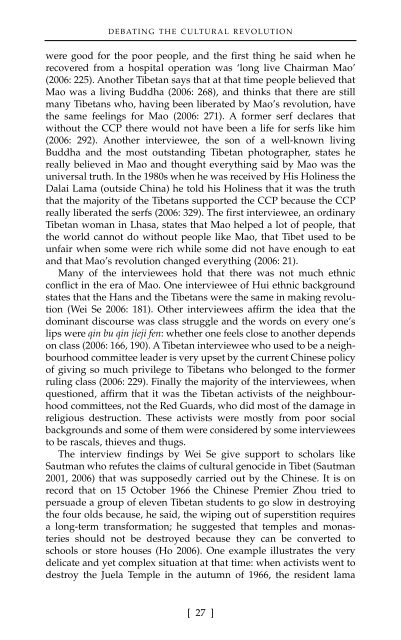Battle for China's Past : Mao and the Cultural Revolution
Battle for China's Past : Mao and the Cultural Revolution
Battle for China's Past : Mao and the Cultural Revolution
Create successful ePaper yourself
Turn your PDF publications into a flip-book with our unique Google optimized e-Paper software.
DEBATING THE CULTURAL REVOLUTION<br />
were good <strong>for</strong> <strong>the</strong> poor people, <strong>and</strong> <strong>the</strong> first thing he said when he<br />
recovered from a hospital operation was ‘long live Chairman <strong>Mao</strong>’<br />
(2006: 225). Ano<strong>the</strong>r Tibetan says that at that time people believed that<br />
<strong>Mao</strong> was a living Buddha (2006: 268), <strong>and</strong> thinks that <strong>the</strong>re are still<br />
many Tibetans who, having been liberated by <strong>Mao</strong>’s revolution, have<br />
<strong>the</strong> same feelings <strong>for</strong> <strong>Mao</strong> (2006: 271). A <strong>for</strong>mer serf declares that<br />
without <strong>the</strong> CCP <strong>the</strong>re would not have been a life <strong>for</strong> serfs like him<br />
(2006: 292). Ano<strong>the</strong>r interviewee, <strong>the</strong> son of a well-known living<br />
Buddha <strong>and</strong> <strong>the</strong> most outst<strong>and</strong>ing Tibetan photographer, states he<br />
really believed in <strong>Mao</strong> <strong>and</strong> thought everything said by <strong>Mao</strong> was <strong>the</strong><br />
universal truth. In <strong>the</strong> 1980s when he was received by His Holiness <strong>the</strong><br />
Dalai Lama (outside China) he told his Holiness that it was <strong>the</strong> truth<br />
that <strong>the</strong> majority of <strong>the</strong> Tibetans supported <strong>the</strong> CCP because <strong>the</strong> CCP<br />
really liberated <strong>the</strong> serfs (2006: 329). The first interviewee, an ordinary<br />
Tibetan woman in Lhasa, states that <strong>Mao</strong> helped a lot of people, that<br />
<strong>the</strong> world cannot do without people like <strong>Mao</strong>, that Tibet used to be<br />
unfair when some were rich while some did not have enough to eat<br />
<strong>and</strong> that <strong>Mao</strong>’s revolution changed everything (2006: 21).<br />
Many of <strong>the</strong> interviewees hold that <strong>the</strong>re was not much ethnic<br />
conflict in <strong>the</strong> era of <strong>Mao</strong>. One interviewee of Hui ethnic background<br />
states that <strong>the</strong> Hans <strong>and</strong> <strong>the</strong> Tibetans were <strong>the</strong> same in making revolution<br />
(Wei Se 2006: 181). O<strong>the</strong>r interviewees affirm <strong>the</strong> idea that <strong>the</strong><br />
dominant discourse was class struggle <strong>and</strong> <strong>the</strong> words on every one’s<br />
lips were qin bu qin jieji fen: whe<strong>the</strong>r one feels close to ano<strong>the</strong>r depends<br />
on class (2006: 166, 190). A Tibetan interviewee who used to be a neighbourhood<br />
committee leader is very upset by <strong>the</strong> current Chinese policy<br />
of giving so much privilege to Tibetans who belonged to <strong>the</strong> <strong>for</strong>mer<br />
ruling class (2006: 229). Finally <strong>the</strong> majority of <strong>the</strong> interviewees, when<br />
questioned, affirm that it was <strong>the</strong> Tibetan activists of <strong>the</strong> neighbourhood<br />
committees, not <strong>the</strong> Red Guards, who did most of <strong>the</strong> damage in<br />
religious destruction. These activists were mostly from poor social<br />
backgrounds <strong>and</strong> some of <strong>the</strong>m were considered by some interviewees<br />
to be rascals, thieves <strong>and</strong> thugs.<br />
The interview findings by Wei Se give support to scholars like<br />
Sautman who refutes <strong>the</strong> claims of cultural genocide in Tibet (Sautman<br />
2001, 2006) that was supposedly carried out by <strong>the</strong> Chinese. It is on<br />
record that on 15 October 1966 <strong>the</strong> Chinese Premier Zhou tried to<br />
persuade a group of eleven Tibetan students to go slow in destroying<br />
<strong>the</strong> four olds because, he said, <strong>the</strong> wiping out of superstition requires<br />
a long-term trans<strong>for</strong>mation; he suggested that temples <strong>and</strong> monasteries<br />
should not be destroyed because <strong>the</strong>y can be converted to<br />
schools or store houses (Ho 2006). One example illustrates <strong>the</strong> very<br />
delicate <strong>and</strong> yet complex situation at that time: when activists went to<br />
destroy <strong>the</strong> Juela Temple in <strong>the</strong> autumn of 1966, <strong>the</strong> resident lama<br />
[ 27 ]
















